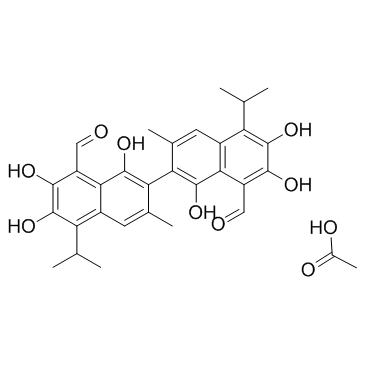
Gossypol acetic acid
CAS No. 12542-36-8
Gossypol acetic acid( ±)-Gossypol acetic acid )
Catalog No. M11030 CAS No. 12542-36-8
Gossypol acetic acid ((±)-Gossypol acetic acid) is a natural phenol that permeates cells and acts as an inhibitor.
Purity : >98% (HPLC)
 COA
COA
 Datasheet
Datasheet
 HNMR
HNMR
 HPLC
HPLC
 MSDS
MSDS
 Handing Instructions
Handing Instructions
| Size | Price / USD | Stock | Quantity |
| 50MG | 35 | Get Quote |


|
| 100MG | 58 | Get Quote |


|
| 500MG | 138 | Get Quote |


|
| 1G | Get Quote | Get Quote |


|
Biological Information
-
Product NameGossypol acetic acid
-
NoteResearch use only, not for human use.
-
Brief DescriptionGossypol acetic acid ((±)-Gossypol acetic acid) is a natural phenol that permeates cells and acts as an inhibitor.
-
DescriptionGossypol acetic acid ((±)-Gossypol acetic acid) is a natural phenol that permeates cells and acts as an inhibitor for several dehydrogenase enzymes such as lactate dehydrogenase, NAD-linked enzymes; a BH3 mimetic that binds and antagonizes anti-apoptotic effect of Bcl-2 family proteins, inhibits tumor growth in Wus1-bearing mice.Blood Cancer Phase 2 Clinical(In Vitro):Gossypol, a natural product isolated from cottonseeds and roots that has been studied as an anticancer agent. The racemic form of Gossypol [(±)-Gossypol] is tested in several clinical trials and is well tolerated. The racemic form Gossypol ((±)-Gossypol) binds to Bcl-xL protein with a Ki of 0.5 to 0.6 μM. (±)-Gossypol also potently binds to Bcl-2 protein with a Ki value of 0.2-0.3 mM. The natural racemic Gossypol has two enantiomers, namely the (-)-Gossypol and (+)-Gossypol enantiomers. The racemic form and each of the enantiomers of Gossypol are tested against UM-SCC-6 and UM-SCC-14A in 6-day MTT assays. (-)-Gossypol exhibits greater growth inhibition relative to (±)-Gossypol than (+)-Gossypol in both cell lines tested (P<0.001). An intermediate growth inhibitory effect is observed with (±)-Gossypol but this effect is only observed at the higher dose of Gossypol (10 μM, P<0.0001).
-
In VitroGossypol, a natural product isolated from cottonseeds and roots that has been studied as an anticancer agent. The racemic form of Gossypol [(±)-Gossypol] is tested in several clinical trials and is well tolerated. The racemic form Gossypol ((±)-Gossypol) binds to Bcl-xL protein with a Ki of 0.5 to 0.6 μM. (±)-Gossypol also potently binds to Bcl-2 protein with a Ki value of 0.2-0.3 mM. The natural racemic Gossypol has two enantiomers, namely the (-)-Gossypol and (+)-Gossypol enantiomers. The racemic form and each of the enantiomers of Gossypol are tested against UM-SCC-6 and UM-SCC-14A in 6-day MTT assays. (-)-Gossypol exhibits greater growth inhibition relative to (±)-Gossypol than (+)-Gossypol in both cell lines tested (P<0.001). An intermediate growth inhibitory effect is observed with (±)-Gossypol but this effect is only observed at the higher dose of Gossypol (10 μM, P<0.0001).
-
In Vivo——
-
Synonyms±)-Gossypol acetic acid
-
PathwayAngiogenesis
-
TargetBcl-2
-
RecptorBcl-2
-
Research AreaCancer
-
IndicationBlood cancer
Chemical Information
-
CAS Number12542-36-8
-
Formula Weight578.6064
-
Molecular FormulaC32H34O10
-
Purity>98% (HPLC)
-
Solubility10 mM in DMSO
-
SMILESCC1=C(C(=C2C(=C1)C(=C(C(=C2C=O)O)O)C(C)C)O)C3=C(C=C4C(=C3O)C(=C(C(=C4C(C)C)O)O)C=O)C.CC(=O)O
-
Chemical Name1,1',6,6',7,7'-hexahydroxy-5,5'-diisopropyl-3,3'-dimethyl-[2,2'-binaphthalene]-8,8'-dicarbaldehyde,acetic acid
Shipping & Storage Information
-
Storage(-20℃)
-
ShippingWith Ice Pack
-
Stability≥ 2 years
Reference
1. Lin J, et al. Oncol Rep. 2013 Aug;30(2):731-8.
2. Ciereszko A, et al. Aquat Toxicol, 2000,49(3):181-187.
3. Ferdek PE, et al. Cell Death Dis. 2017 Mar 2;8(3):e2640.
molnova catalog



related products
-
BT2
BT2 is a BCKDC kinase (BDK) inhibitor with an IC50 of 3.19 μM. BT2 (compound 4) is also a potent and selective Mcl-1 inhibitor with a Ki value of 59 μM.
-
Apogossypol
Apogossypol (NSC 736630) is a Bcl-2 family antagonist that binds to Bcl-XL, Bcl-2 and Bcl-xL with IC50 of 2.6, 2.8 and 3.69 uM, respectively.
-
BAI1
BAI1 (Bax channel blocker) is a potent inhibitor of Bax-mediated mitochondrial cytochrome C release (IC50: 0.52 μM).



 Cart
Cart
 sales@molnova.com
sales@molnova.com


